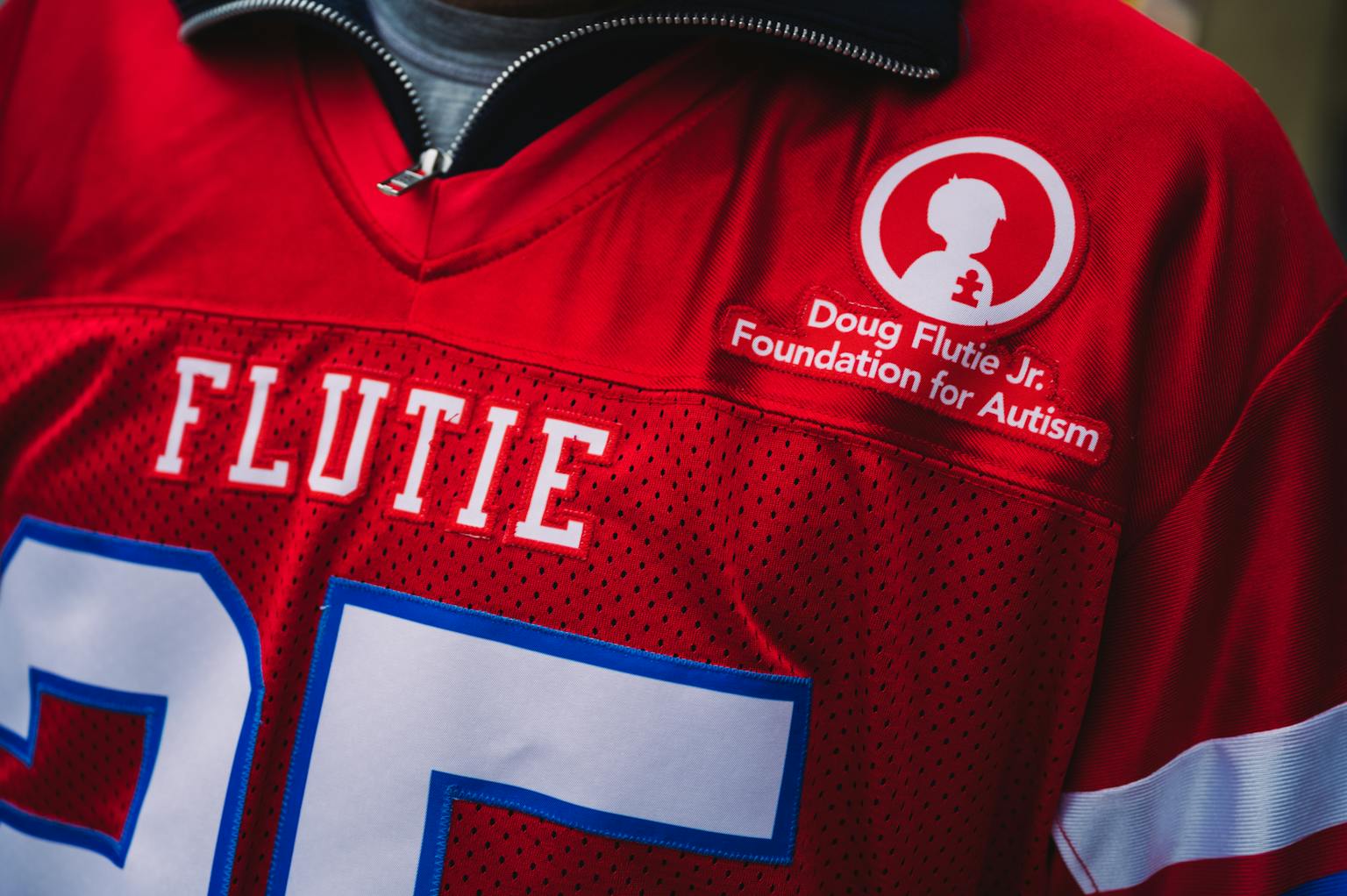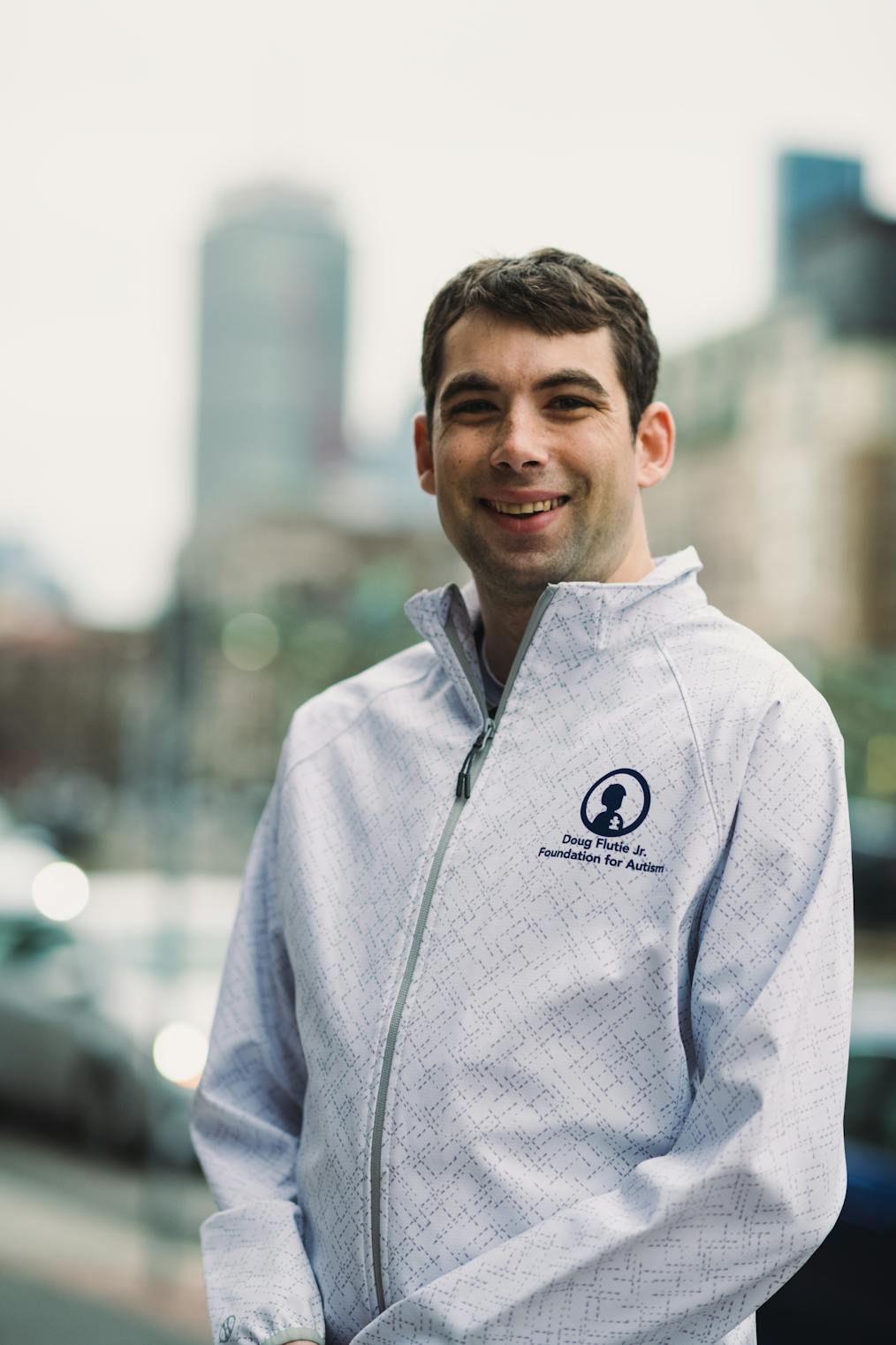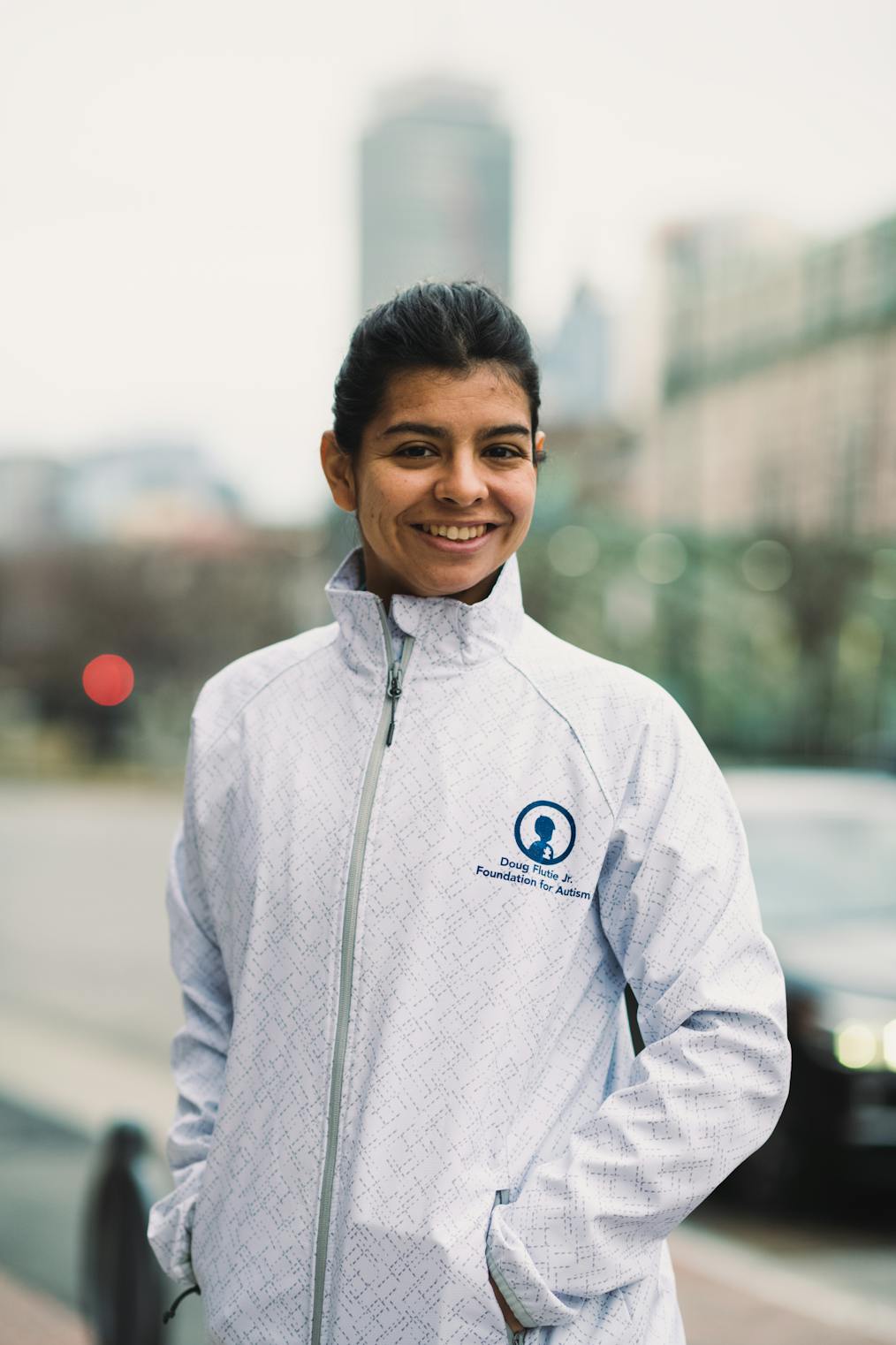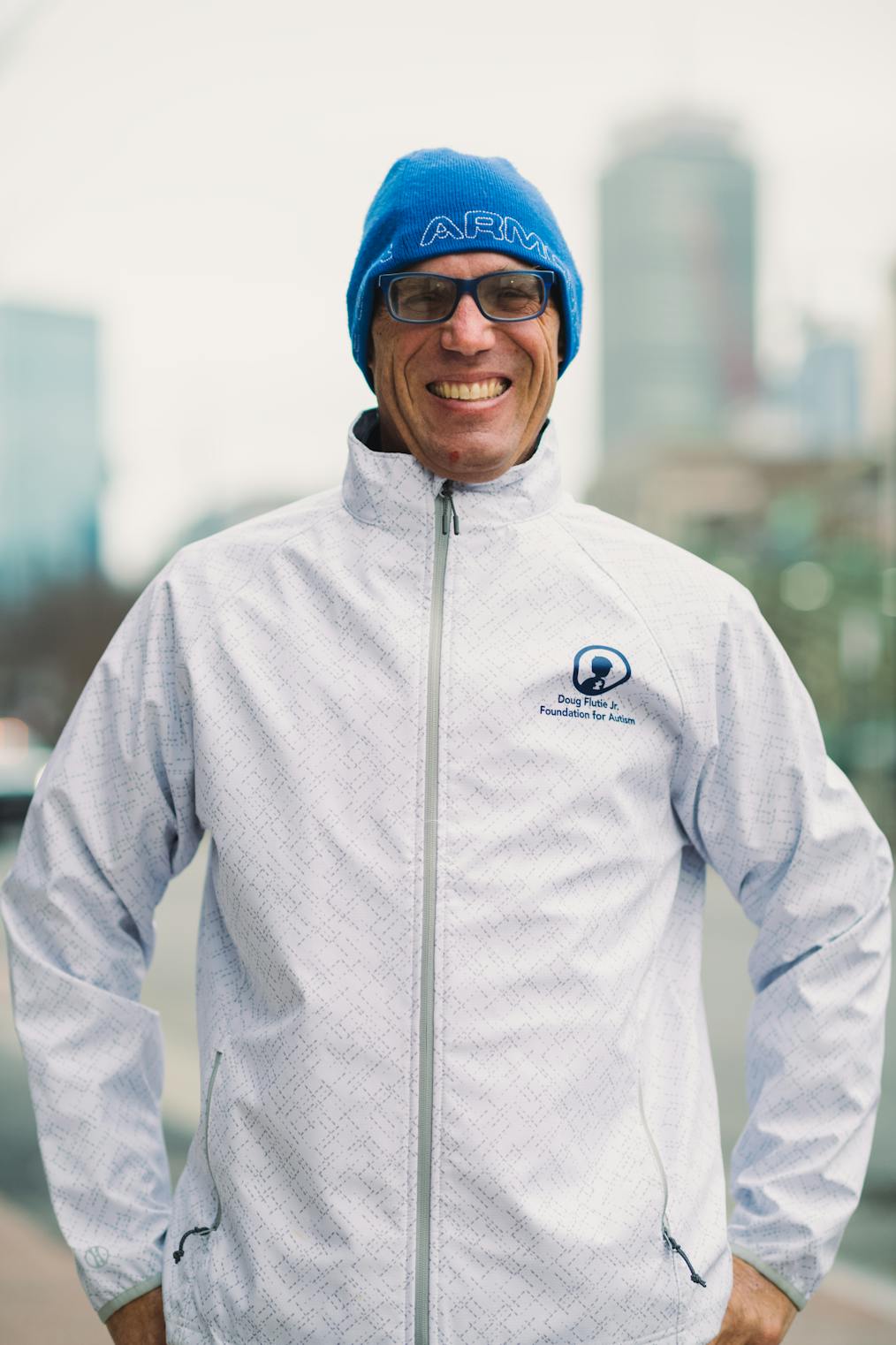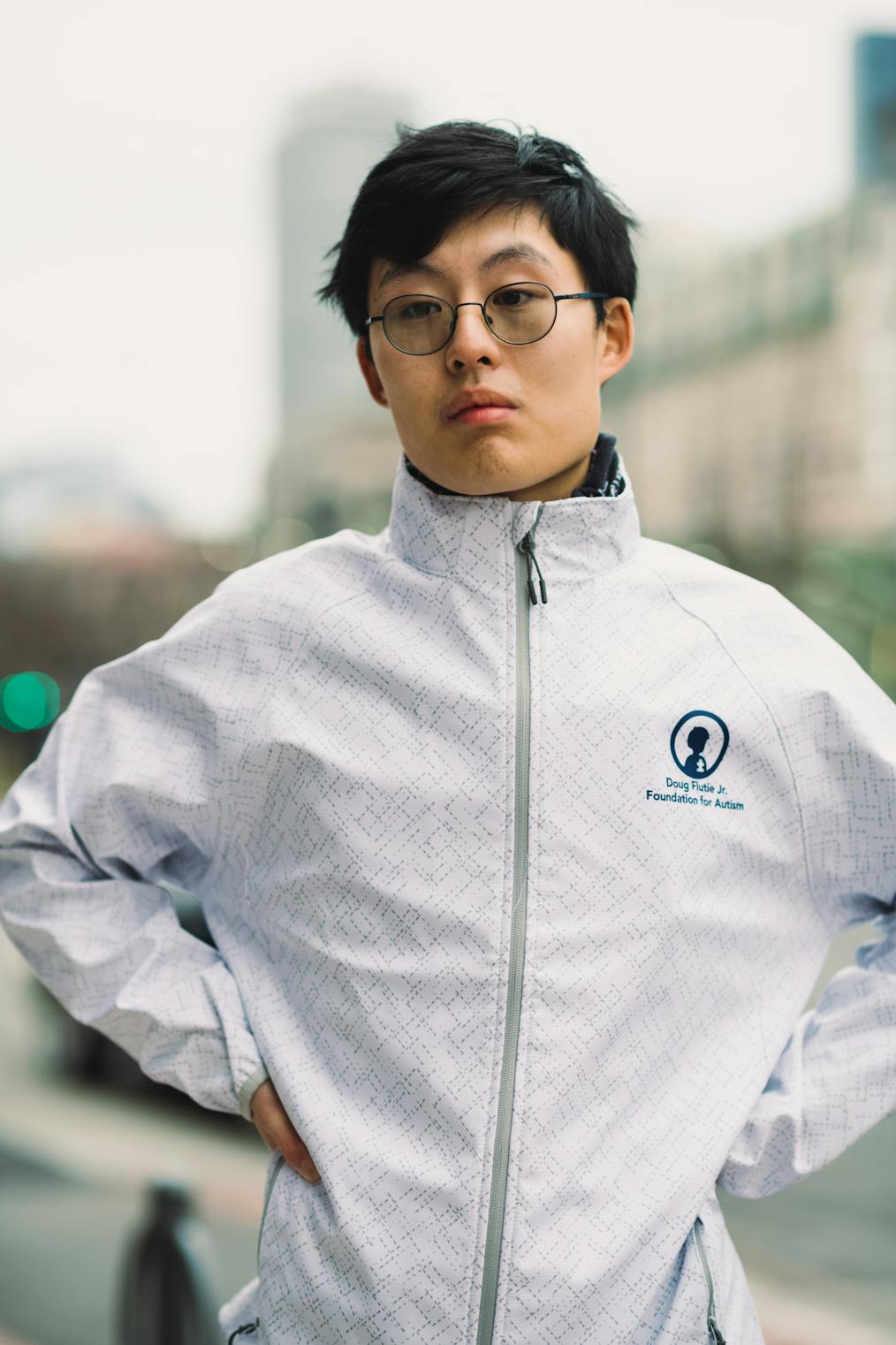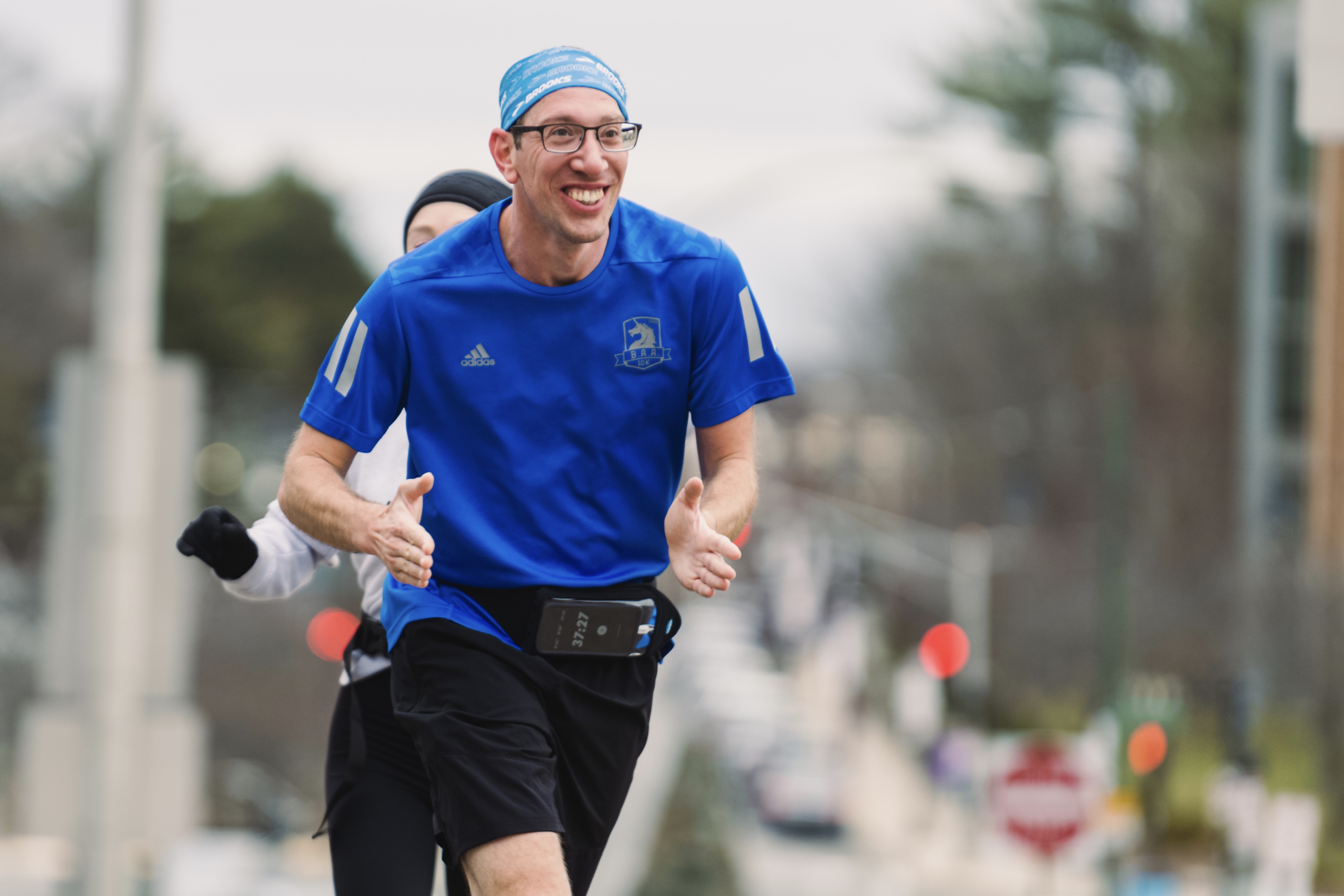
Adaptive Runners:
Prove Us Wrong
Words by Sheridan Wilbur
Photography by Adam Parshall
HE RAN IN THE OTHER direction when the 2022 Boston Marathon began. A stampede of runners embarked towards Boylston Street while Mike Palmer jogged home through Hopkinton, a mile and a half from the start line, practically the backyard of the course. “Hey, you’re going the wrong way. Boston is the other way!” Spectators heckled.
He had planned to watch and cheer, to get a taste for the Boston Marathon, then run home, but Palmer, who is autistic, began to get a feeling most of us can empathize with: that of separating yourself from the rest of the world, into a resolve of misunderstanding and solitude. He says it was familiar, that feeling, as he took strides against hundreds of spectators, trying to get home. Though something sparked in that moment because Palmer was finally seen as a Boston Marathon runner, albeit a rather lost one.
In an effort to make the marathon more inclusive, the Boston Athletic Association has a division called the Adaptive Program for Runners – a category for male and female runners with some kind of physical and/or intellectual impairment who can complete the marathon in under six hours, or have an awareness/visual impairment and can complete the distance in under five hours. This broad-stroke division differs from the Para Athletics Division which is limited to elite athletes.
“The hardest part is getting them to the start line, there’s crazy logistics, navigating buses, crowds,” says Ethan Michaud, Sr. Development Manager at the Flutie Foundation, a local non-profit aiming to improve the lives of people with autism. “Once they’re running, they’re in the zone, and locked in.”
Autism or autism spectrum disorder (ASD) is a broad range of conditions that varies widely from person to person, characterized by challenges with social skills, repetitive behaviors, speech and nonverbal communication, and often comes with physical limitations. Many people with autism might experience sensory issues such as sensitivity to light and sound, as well as a muted sense of pain.
“I don't feel accepted at all, other than in the running community,” says Palmer. “There have been days where I go home after a long day, and I just cry in bed and ask myself why I’m here, why am I doing this? It's extremely tough. I would like people to start understanding that we have feelings too. We're always the ones that are left out.”
People with autism may feel alone as a symptom of their neurodivergence but recent data shows autism rates have risen, up from 1 in 44 children in 2018 to 1 in 36 in 2020.
Another Mike, Mikey Brannigan, is a well-known example of an autistic runner who’s succeeded in a sport that made rules without him in mind. A two-time Paralympian, the winner of the 1500m gold medal at the Rio 2016 Paralympic Games and the first person with autism to break four minutes in the mile, Brannigan outperformed the odds, yet a lack of support for autistic amateur runners remains an issue.
“I don't wanna sound cocky or anything, but it's time people start accepting us,” says Palmer.

ERIC FISHMAN WAS TOLD he wouldn't be able to drive, talk or do much else upon his autism diagnosis. "I was just going to be ugh, like a blob," he says. However, with his parents' guidance, he enrolled in Driver's Ed during his ninth-grade summer. The Driver's Ed instructor happened to be the cross country coach and convinced him to join the team. On the first day of practice, Fishman couldn't make it around the 400m track. He persevered though. Almost 30 years later, he’s preparing for his ninth marathon, and credits his coach for changing his life.
Running can be a useful tool for autistic people, complementing more formal healthcare interventions and helping to prevent other health problems. A 2016 study found that people with autism who ran or walked for 20 minutes twice a week had significant improvements in endurance, social awareness, cognition, communication, and motivation, as well as fewer restrictive and repetitive behaviors.
Enchee Xu, a runner on Dougie’s Team who was diagnosed with autism and speech and language dysfunction, finds running to be a flexible activity that provides companionship as well as solitude. Today, he’s a member of UMass Amherst’s club running team.
Greg Schwartz, an eight-time marathoner, underwent two brain surgeries, but credits his marathon endurance for a faster recovery. With a personal record of 3:47, Schwartz is determined to beat his time on Dougie’s Team this year in Boston.
"There is a study that shows that people with disabilities work harder than people who don't have disabilities,” Palmer affirms. He has scoliosis and was initially told he would not be able to run, but now he participates in marathons with the help of doctors, coaches, physical therapists and improved body awareness. Palmer has two titanium rods married to his spine as a memento of past surgeries and high-tech shoes to cushion the impact, but his back doesn't hurt anymore when he runs.
Behaviors associated with autism – repetitive actions, following a strict routine, and having a dedicated interest in a constructive way – are useful to succeed in marathons and play to their strengths. Unfortunately, running remains on the periphery of prescribed therapy for people with autism and instead, plans focus on expensive and time-consuming activities like occupational therapy, speech therapy and physical therapy. Running remains an outsider pursuit.
ON MARCH 17, Dougie's team completed their final long run on the Boston course, creating a sense of camaraderie and sense of family that is inclusive for people who often feel left out. "I don't feel left out this year,” Palmer says. “Marathon Monday is gonna be awesome for all of us.”
For people with autism, establishing trust can be challenging, as trust is the opposite of anxiety, according to Barry Prizant, a world leading expert on autism. Prizant considers autism to be a disability in trust. However, Dougie’s Team invests in building trust with their athletes, and understands it’s a process between individuals.
The first time Fishman showed up to practice, the coaches gave him a big hug. “They told me once I’m Team Dougie, I’m Dougie’s [Team] for life. They just made me feel like I mattered,” he says. In addition, with support from family, doctors and his girlfriend, Fishman’s been able to navigate meaningful interpersonal relationships and is looking forward to race day. “I would be lying to say I'm not worried about mentally crashing again,” he says. “But they’re not gonna let that happen. I'm not gonna let that happen.”
Guides also play an essential role in helping adaptive runners communicate their pain and rely on someone else on race day. By offering choices, such as what pace to run and where to go next, guides can build trust with runners. For many adaptive runners, this relationship transforms them from feeling left out, to feeling empowered and in control, while doing what they love.
“My number one goal is nothing but just utter fun,” Fishman says. “It’s a struggle fest but I want to take every moment in. No matter what, I want to keep that smile on my face.”
FISHMAN FULFILLED HIS LIFELONG dream by running the 2021 Boston Marathon after recovering from Covid. “I was running on such an adrenaline rush, then I came way down. I literally crashed," he says. Fishman experienced depression, anxiety and memory loss upon returning to Florida, where he works as a cross country coach. With his mother’s help, he relearned basic skills like how to talk, walk, cook, drive, and run.
Despite experiencing depression, anxiety and memory loss which are common for people with autism, Fishman has found that running can help ward off negative feelings and provide a euphoric feeling of a "runner's high.” Emotionally, he has felt a change lately, a more confident and stable shift. Running makes him feel like he doesn’t have a disability and helps amplify his self-esteem. People close to him have noted a degree of positivity, a sunnier disposition, that wasn’t present for months after his last Boston. Fishman has been repeating the mantra to himself over the past six months: ‘Anything’s possible.’
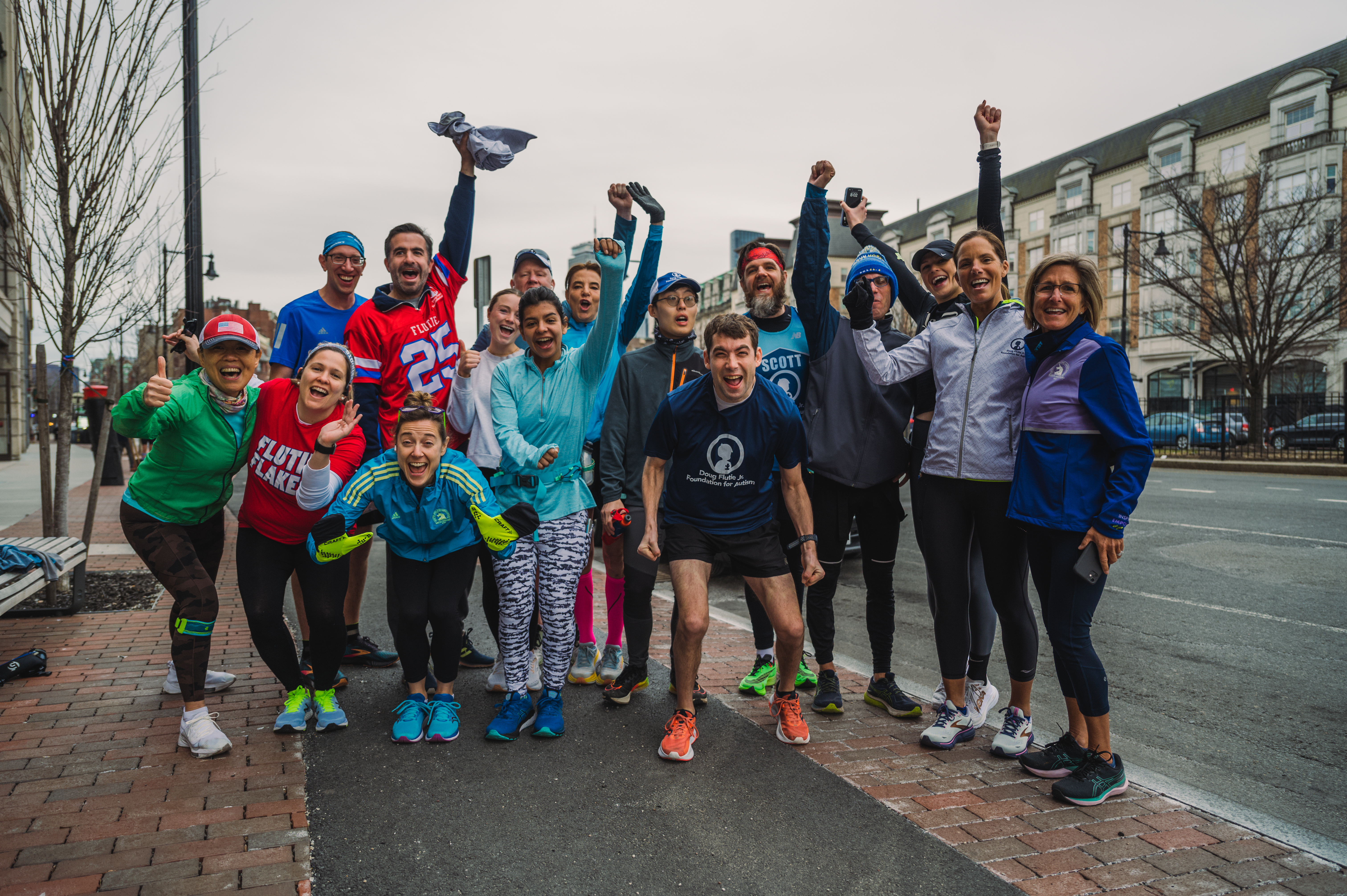
Kyle Grossman, an avid marathoner, got injured at mile 15 while running Boston in 2021 but refused to stop. While he aims to break four hours this year, he says, “What matters is that people see us doing it.” The sight of people who are autistic running in a major marathon like Boston is a visual testimony to the transformative power of running, turning the qualitative, seemingly-individual sport, into an equalizer based on time, not disability – a place of common ground among the community. For the most part, the running community is one of the few environments where adaptive athletes are treated normally, acknowledged and respected.
“When Greg started running, they didn't see the disability, they saw that he was a good runner. He was like them and he was accepted. As a parent, it really made me feel good to show that people with disabilities can do the same thing as everybody else,” says Schtwartz’s mother. How can someone be culturally relevant or seen as an equal if their contributions are not acknowledged?
LAST YEAR, PALMER VISITED his old high school gym, which was used as the athletes' village for the Boston Marathon, for the first time in nearly a decade. He saw a mural of the Boston Marathon start line, featuring photos of every person who was in the Hopkinton school system who had run the race at the time, including himself, at the time of the mural creation. He appreciates the recognition but says, “We're not there yet. People need to understand us, get to know us and not just from the outside.”
Palmer isn’t waiting for the world to change on his behalf. Instead, he’s changing it. On Marathon Monday, Mike, along with five of his adaptive teammates will be going the way to Boston, with everyone else.
